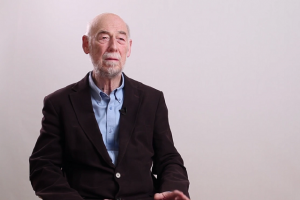Logic and Mathematics
Philosopher Denis Bonnay on Kant's "Critique of Pure Reason", logical inferences, and attempts to divide math...
One very difficult traditional question in philosophy concerns what is good, and, in particular, what is good for people. In the Western tradition if you go to back to Plato and Aristotle, fundamental to their philosophy was an account of what’s good for people. For Plato it’s a very complicated story in terms of what he calls “the form of the good”, the notion that there’s some sort of an object of good out there in the world. And to the extent that we can participate in it, link ourselves to it — that’s what’s going to be “what’s good”. To explain Plato would be a much longer task than I can do here.
Aristotle, at least apparently, gives us a much simpler view of what’s good. He maintains that the good for individuals is happiness, which is something that seems plausible nowadays, although by happiness he didn’t quite mean what we mean by happiness in English nowadays. He meant something more like an activity that was governed by people’s rationality and which was something that people could justify, so happiness was something active.
The general question of what’s good for people is one that hasn’t gone away and one where there isn’t any single dominant satisfactory account in philosophical literature.
If one jumps from Aristotle to the beginnings of modern philosophy, the end of the Middle Ages, one finds a very different view of well-being, for example in someone like Thomas Hobbes, the British philosopher, who sees people as endlessly driven by their desires.
He thinks of it as appetites, he doesn’t think of these as particularly cognitive and complex, and what it is that makes for a successful life is your desires getting satisfied — that’s what well-being is. He also regards that as what happiness is. If we succeed in getting what we want, we’re happy, and if we don’t – we are unhappy, which contrasts drastically with Aristotle’s view about what happiness is. So Hobbes had the view that happiness and well-being are simply a matter of getting people’s desires satisfied.
So what one can do with respect to a desire-satisfaction theory of the sort that Hobbes has, is to say: “Well, let’s clean up people’s desires. Let’s think about what people would desire if they didn’t have false beliefs, if they were able to take time to think carefully. If they were focused on themselves rather than other people”. Thus, perhaps, we can say that well-being is the satisfaction of these “cleaned up” desires or preferences. So that’s one of the currently dominant views.
Another one of those views sounds as if it harkens back to Aristotle because it says that well-being is happiness. However, given what Aristotle meant by happiness it’s really rather different than Aristotle’s view. It’s the view that, basically, what we’re looking for is the right mental states, and the right mental states are what makes us better off. So, if you look at someone like Jeremy Bentham in the late XVIII and early XIX century, who was the founder of so-called Utilitarianism, in his view well-being as simply pleasure and the absence of pain.
But there’s lots of different kinds of pleasures, there are enormously different pleasures: the pleasure one gets if one is a lover of classical music and listens to a Tchaikovsky Symphony is going to be very different than the kind of pleasure one gets from eating a really delicious dessert or from drinking a glass of vodka — these are different kinds of pleasures. And, similarly, pains – if you think of something like dizziness, dizziness isn’t painful but it’s clearly a very unpleasant experience. And so we have this tremendous heterogeneity of pleasures and pains, and it’s not exactly clear what this theory of well-being would be.
Moreover, this theory of well-being faces what is to me a really decisive objection. That is, it says that well-being is simply a matter of your mental states, it has nothing to do with reality. So you can have two individuals whose mental states are just the same, both of them think that their lives are going wonderfully, that their children are thriving in school, that their co-workers respect them. One of them is absolutely right, the other is just deceived: his children are taking drugs, his life is sleeping with other people, his co-workers hate him and make fun of him behind his back.
The notion that these two people’s lives are just as good, because their mental states are just as good, from my perspective, really misses what we’re concerned with when we’re concerned with the theory of well-being.
A third theory of well-being, in some ways, is much more satisfactory, and, in some ways, is utterly unsatisfactory. These are so-called “Objective list” theories of well-being. So, what’s well-being? It consists of being healthy, having a good mental state, succeeding in important activities that one’s concerned with, having friends, and having friends for whom terrible tragedies don’t happen. So we can list a number of things like that. But it’s pretty unsatisfactory as a philosophical theory, because it’s obvious that different mixtures of these goods are good for different people.
There’re some people for whom friendship is really what life is all about, there are other people for whom friendship is very unimportant. Even if it has a role in everyone’s life, how big a role it has is going to differ enormously. So we don’t really have a theory about what makes individuals’ lives’ well-being, we have a list of the ingredients. But we have nothing in this theory at all about how to cook those ingredients, how to make a good life out of them. So, we really don’t have a theory of well-being.
Now, going back to the Preference satisfaction theory, many philosophers think that if we clean up preferences, then we have a satisfactory theory of well-being. In my view, that’s really not the case, because I think one really needs to take seriously the first person perspective when one thinks about making choices oneself and if one thinks about forming one’s preferences.
Which of these would be better in terms of their properties and my value judgments concerning those properties, all things considered, or which would be better if I’m self-interested with respect to just me? And the notion of “betterness” there is some other notion. So I think that the account that it’s simply preference satisfaction tells us how we can learn about other people’s views about what’s good for them, but doesn’t give us a theory about what actually is good for people.
Now, at this point you might say: “Well, he’s giving us a really discouraging picture,” that all the philosophical theories of well-being are faulty and none of them are much good, which is, in fact, my view. But you might say: “How in the world do we even know what well-being is then, if none of the philosophical theories are any good?”
Well, if people needed a good philosophical theory of well-being to have any idea about what makes for a good life, no one would have any idea what works for a good life, because I don’t think there is a satisfactory theory.
On the other hand, in everyday life we accept what I would call a kind of folk theory of well-being. It’s not a satisfactory philosophical theory, in lots of ways it’s sort of like the Objective list theory, but it doesn’t have any great philosophical pretenses. It’s rather that if we see somebody who’s suddenly become extremely ill, they’ve been diagnosed with cancer or whatever, we judge that their life has taken a turn for the worse. If we later discover the person is cured we say the person’s life has taken a turn for the better, because we think that health is an important constituent of well-being. How important or what the general notion is — we don’t know.
We’ve got a bunch of what one might call platitudes concerning well-being. If you get along well with your friends, your life is better; if you feel better, your life is better; if you manage to have someone who is really important to you, either within your family, or just a really close friend — those are the sorts of things that make your life better. So I think that’s where we are. Those things provide a touchstone on the basis of which we can assess different theories of well-being, but I don’t think we have anything like a satisfactory theory of well-being.

Philosopher Denis Bonnay on Kant's "Critique of Pure Reason", logical inferences, and attempts to divide math...

Philosopher Dennis Bonnay on metamathematics, set theory, and the Gödel's theorem

Historian and Philosopher of Logic Stephen Read on the history of paradoxes, semantic paradoxes, and its direc...